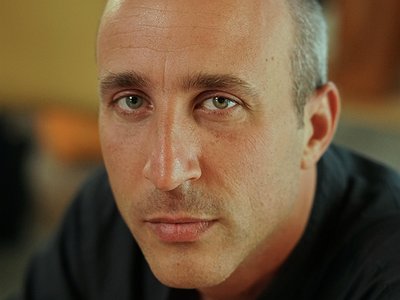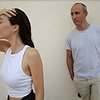Part 1
Name: Sandro Mussida
Occupation: Curator, Composer, Cellist, Electronic Performer
Current Release: Dare Voce with Olivia Salvadori
Festival/ Concert Space Recommendations: Something fresh and unpredictable that mixes medium established acts with brand new experimental projects is the series How To Become A Cult Leader in London. Concert spaces like Standards or Spazio O in Milan offer well-picked electro-acoustic and new electronic sets.
If you enjoyed this interview with Sandro Mussida, you can find more information on his website.
When did you start in a curatorial role - and what or who were your early passions and influences?
I guess I’ve always been close to the making-of of the artistic practice. Being the son of a big touring musician meant I spent my entire childhood behind the curtains and on the road, so it became pretty natural later on to take care of the productive and curatorial side of the activities I was putting on myself. I started as many others did; in high school producing a series of parties (regarding which I was pretty serious!) Curating for me is the perfect match between two aspects: artistic coherence and practical efficiency... in this sense, most of my life is a curatorial experience!
What do you personally consider to be the incisive moments in your work and/or career?
Despite my age, I consider my career just about to begin. But there are some encounters that fostered my confidence in writing and performing and gave my work some visibility: In Memoria, the work for solo guitar for Alessandra Novaga published by Blume Editions; the release of Object Relation, with the electronic producer Mark Fell; the first edition of our TQS International Encounters On Matters Of Sound in 2014 in Tuscany. Lately, having had Sony Classical Italy publish the long time collaboration with soprano Olivia Salvadori this winter.
How would you describe and rate the music scene of the city you are currently living in and how much does it get featured in your programming?
I moved to London some two years ago. What I’ve found here is an incredibly rich scenario... you feel the industry pushing on one side, the pop culture consuming and demanding more and more, but you can also feel the starving and the efforts of the artist’s community to open up new streets. It’s not easy to make a living out of your passion here, but these hard conditions drive ideas and many projects are born out of these needs. Speed is a must. But there is also a tremendous mix of people searching new ways, travelling, experimenting. Small places, like the Hundred Years Gallery in Hoxton, run courageous avant-garde series or a place like TRC in Dalston which gathers electronica with folk. Here questions arise on, for instance, redefining what a genre is, or how a tradition rooted somewhere else can be experienced in urban settlements, or how some old movements are reshaped out of their context etc. It seems that London gives you no time and space for thinking at its culture. To some extent, the present time is everything; there's no space for thinking at the past, and the future is a short shot.
That’s extremely interesting for a musical mind. For the good, this means freedom to use what you have around, no matter where or when it came from, or to whom you give this to. The audience here is the best a musician can dream about; attentive, but open to any possible output.
Is objectivity in any way a goal in your own work? What, other than your personal taste, are criteria for defining quality?
Objectivity is a useful tool. Not a goal itself. I write my own rules when composing, and it happens often that observing a system from above is what I want to achieve with a work. The work Ventuno Costellazioni Invisibili is something like this. But, if composition is more than projection and calculation (and it is), then you want your work reacting to your schemes and let it take you somewhere else. In this fragile balance between prediction and autonomous fate, there lies objectivity. Similarly, I judge my works in their ability to speak ‘for’ and not ‘of’ themselves, if you get what I mean. Most of the time, I fail at keeping this balance between the materials and the rules a living one; but it is worth trying.
How would you describe your role in the creative process?
The composer demands autonomy and silence, planning and precision; the cellist asks for rehearsals, more time and space for play with the others; the producer makes plans over the other two. Sometimes is hard to make all these voices heard/speak at the same time. When I’m stuck, I do some sport.
Tell me a bit about your perspective on the selection process for your programming, please. In how far do PR companies, the media and public awareness of an artist or band play a role in programming them? How much room is there in your work for taking creative risks?
For me curating, inviting an artist to collaborate, is dealing with the human biography; not only one’s career or his artistic achievements are relevant. The encounters that left some positive marks in my musical adventures are often the ones PR companies would not pick. In the TQS residency we often worked to achieve that fragile balance given by the juxtaposition of human characters, as well as musical languages. If curating is to give resources to someone to express his research, then there are many important factors to be taken into consideration, from the physical place you pick for the occasion (if you not been given one already) which will play a strong influence (despite what artists themselves would admit), to the food you provide, the schedule you plan for the day or week, the people you have around etc. Regarding the creative risks, you are taking them in any case, even in inviting the most predictable/successful host! So to me, it's more interesting to be focused on the best unpredictable program than let a good PR company make the plans.
Programming music can occasionally lead to deeper insights into the music itself. In which way, do you feel, can curating change the way music and certain styles of music are perceived?
Context is so important: try to read the same sentence in different hours of the same day. If I care about the fundamental relationship between the listener, its context and the artist, then I need to create an environment where it’s possible to take some risks and to exchange something. The listener is the subject we need to care about. If a given setting is able to let our defenses down, we are able to embrace any experience. I talk about experience because this is what I’m interested in; music should have no spectators, only participants. At its best, a concert is a ritual where everybody vibrates at the same frequencies. With the project Dare Voce we’ve been lucky enough to play most of the time in non-classical events, where the audience is not used to the operatic voice, but maybe it’s more open to the new. The audience’s answer amazed us. I think we all are more than happy to embrace the change if we feel we are part of it. Sometimes a good balance between curiosity and surprise can help.






